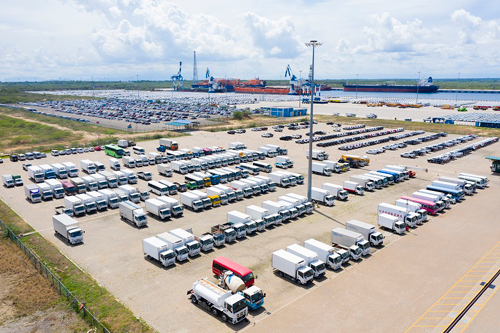Typewriters and computers
View(s):
Vehicles piling up at the Hambantota Port as collection has been delayed.
I remember Nandani who worked as a ‘typist’ in our office in the university. She was sitting in front of an old Olympia typewriter placed on her table. Anyone who entered the office those days could often hear the noise of her typewriter; it sounds like “taka… takas, taka… takas, tik…tik…tik, tin…n…n…n”
It was in the 1980s and such typewriter noises coming from office rooms were not strange to anybody. By the end of the decade, a couple of computers came to the office. They had big monochrome monitors which displayed green colour letters on black background; the monitor was on a big CPU, placed horizontally on the table. The VGA colour monitors replaced the monochrome monitors in the mid-1990s. Later, the new Microsoft Operating System and the Office applications such as Word, Excel and Access made the computers faster and user-friendly and, its display even more beautiful.
Gradually, the typewriter became an obsolete office equipment, as it was replaced with fast-changing computers. Nandani’s typewriter was also outdated now. By this time no repairs could be done easily while parts for typewriters were difficult to find. Together with outgoing typewriters, the office post called ‘typist and stenographer’ was also becoming obsolete.
Being a public sector employee Nandani didn’t lose the job, but she actually lost her work. She looked at the computer as an alien equipment and became nervous in front of it. But she had no other choice other than learning some computer literacy to be familiar with ‘Word Perfect’ – the word processing package at that time. In a couple of weeks she learnt to use the computer as a typewriter; in some of the office premises, we still do the same! Until her retirement, Nandani managed to do her typing job with a computer without losing either the job or the work.
Love for protectionism
In this column last week, I presented extracts from a paper on “The (US) Epidemic of Despair” by Anne Case and Angus Deaton (2020) – Emeritus Professors of Princeton University. The paper is about how the healthcare system in the US – the country with the world’s highest health expenditure, leads to people’s despair and deaths of despair. Anyway, this is not a repetition of our last week discussion. But I believe that the discussion left us with a confusion in one particular area, because we focused on a different issue. Let me clarify the point I am referring to.
The following is a quotation from the same paper: “The roots of the crisis of deaths of despair lie in the loss of good jobs for less educated Americans, in part due to globalization, outsourcing, and automation, and in part due to the cost of health care.” The confusion that I am referring to is in the heart of this quotation – people lost jobs due to globalization, outsourcing, and automation, in addition to what we discussed last week, the cost of health care.
I am sure the above quotation can be twisted to say that “we need to have protectionist policies to save jobs”. The same argument can be easily extended to cover the point that “we should protect our domestic production”. Particularly in the world economic affairs today which are subdued by the COVID pandemic, there is a nationalist boost for protectionist sentiments.
“Unprepared for coronavirus”
Let me present an argument from a Bloomberg Opinion column published on March 20, under the title “Offshoring Left the US Unprepared for Coronavirus”. The number of COVID-infected cases as well as the deaths caused by it has been rising exponentially in the US where the medical system is having a serious shortage of face masks, cotton swabs, and ventilators. The writer, Noah Smith says that “it seems almost unthinkable that shortages of these simple materials could hamstring the medical system of the country with the biggest economy on the planet”.
It is a valid question to ask: Why can’t the greatest economy on the planet produce face masks, swabs and ventilators in adequate supply? The writer elaborates his answer: Supply chains that have been created to boost profits have led to outsource production of these items so that they are not available in the country when there is a need. These items are now produced mostly by China, which did not provide them to the US on time. Had the US protected its domestic industries, these items would have been available at the time of their need, while it would have protected American jobs too!
Many would subscribe effortlessly to the above argument. And it too is a ‘politically correct’ argument so that politicians also love to declare it in public. However, if we dig deeper into the economics of the argument, perhaps we may have a different opinion.
Natural outcome of progress
Change in the production patterns is a natural outcome of economic progress. Along the road to prosperity, new production lines emerge. These new production lines keep expanding beyond the local and national boundaries conquering the global markets – globalization. They also begin to demand for new knowledge and new skills as inputs paying higher incomes in return. As the incomes are higher, consumption patterns change to higher levels too.
 We should look at the flip side of economic progress. When the new production lines emerge and dominate the economy, old production lines wither away. Some of them move into poor or developing countries – outsourcing. Old knowledge and skills become less-demanded as the rising demand is for new knowledge and new skills. Labour that is in less-demand will have less-incomes as well.
We should look at the flip side of economic progress. When the new production lines emerge and dominate the economy, old production lines wither away. Some of them move into poor or developing countries – outsourcing. Old knowledge and skills become less-demanded as the rising demand is for new knowledge and new skills. Labour that is in less-demand will have less-incomes as well.
If a country wants to achieve economic progress, the economic policies should promote the process of changing production patterns moving into new production lines. If the country wants to protect existing production patterns, then the policies should protect them obstructing the road to economic progress.
Nandani’s job and work would have been protected easily by denying the computers to her office. Then, the ‘progress of the office’ would have been obstructed and, somehow the old typewriter would have been fixed to keep Nandani’s ‘typist’ job. In fact, she also did change by acquiring new knowledge and skills to a certain extent to work with a computer so that she did not become obsolete. But she did not move beyond her boundaries. Computers changed fast and Internet was introduced, but Nandani never started sending emails instead of preparing type-written hard copies of letters to be sent physically.
Preparing a labour force
Face masks, cotton swabs and ventilators are in shortage in the US, because the COVID issue was unexpected and unprecedented, growing in such magnitude. And the supply of these items all over the world was also disrupted by the same issue. If we argue that the US would have protected its domestic industries, obviously it had to be done by preventing the economic progress of the US and, thereby keeping the US nation poor. Then the economic prosperity that the nation had enjoyed for generations would have been sacrificed, just awaiting 100s of years for an unanticipated event – spread of COVID infection- to take place!
Of course, everything was not rosy and, less-educated and less-skilled people lost jobs as their labour was not demanded by the progressive economy. Nandani’s story tells us that, their employment and income would have been secured if the country’s labour force was prepared with education and vocational training to upgrade their human resources.
Finally, the inverse is also true. The US economy, somehow had higher levels of competitive human resources with new knowledge and skills even from other countries to drive the country to become the richest economy on the planet. But there are countries which have not prepared a labour force with new knowledge and new skills; these countries continue to remain locked up in their middle-income trap.
(The writer is a Professor of Economics at the University of Colombo and can be reached at
sirimal@econ.cmb.ac.lk).



